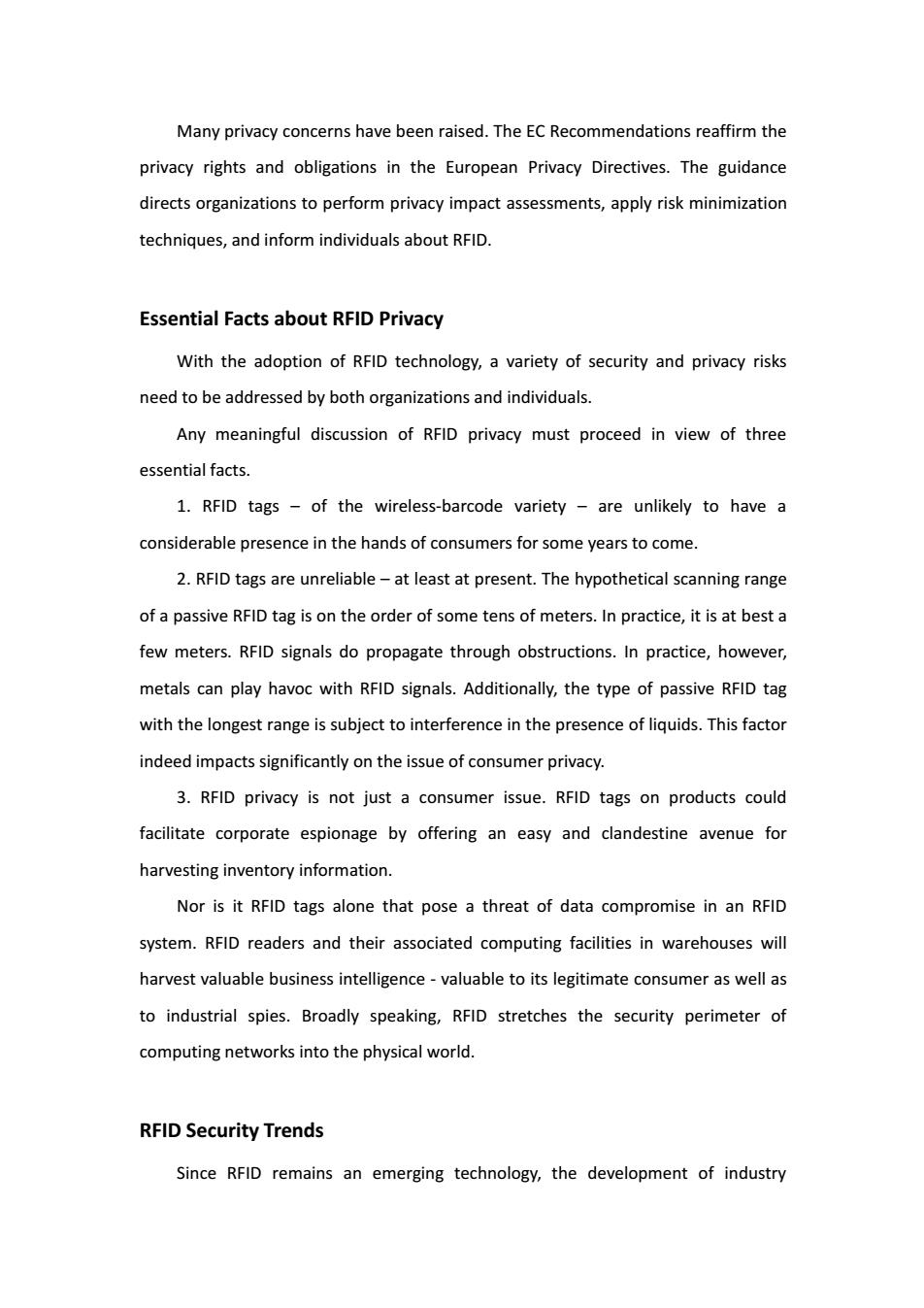正在加载图片...

Many privacy concerns have been raised.The EC Recommendations reaffirm the privacy rights and obligations in the European Privacy Directives.The guidance directs organizations to perform privacy impact assessments,apply risk minimization techniques,and inform individuals about RFID. Essential Facts about RFID Privacy With the adoption of RFID technology,a variety of security and privacy risks need to be addressed by both organizations and individuals. Any meaningful discussion of RFID privacy must proceed in view of three essential facts. 1.RFID tags of the wireless-barcode variety are unlikely to have a considerable presence in the hands of consumers for some years to come. 2.RFID tags are unreliable-at least at present.The hypothetical scanning range of a passive RFID tag is on the order of some tens of meters.In practice,it is at best a few meters.RFID signals do propagate through obstructions.In practice,however, metals can play havoc with RFID signals.Additionally,the type of passive RFID tag with the longest range is subject to interference in the presence of liquids.This factor indeed impacts significantly on the issue of consumer privacy. 3.RFID privacy is not just a consumer issue.RFID tags on products could facilitate corporate espionage by offering an easy and clandestine avenue for harvesting inventory information. Nor is it RFID tags alone that pose a threat of data compromise in an RFID system.RFID readers and their associated computing facilities in warehouses will harvest valuable business intelligence-valuable to its legitimate consumer as well as to industrial spies.Broadly speaking,RFID stretches the security perimeter of computing networks into the physical world. RFID Security Trends Since RFID remains an emerging technology,the development of industryMany privacy concerns have been raised. The EC Recommendations reaffirm the privacy rights and obligations in the European Privacy Directives. The guidance directs organizations to perform privacy impact assessments, apply risk minimization techniques, and inform individuals about RFID. Essential Facts about RFID Privacy With the adoption of RFID technology, a variety of security and privacy risks need to be addressed by both organizations and individuals. Any meaningful discussion of RFID privacy must proceed in view of three essential facts. 1. RFID tags – of the wireless-barcode variety – are unlikely to have a considerable presence in the hands of consumers for some years to come. 2. RFID tags are unreliable – at least at present. The hypothetical scanning range of a passive RFID tag is on the order of some tens of meters. In practice, it is at best a few meters. RFID signals do propagate through obstructions. In practice, however, metals can play havoc with RFID signals. Additionally, the type of passive RFID tag with the longest range is subject to interference in the presence of liquids. This factor indeed impacts significantly on the issue of consumer privacy. 3. RFID privacy is not just a consumer issue. RFID tags on products could facilitate corporate espionage by offering an easy and clandestine avenue for harvesting inventory information. Nor is it RFID tags alone that pose a threat of data compromise in an RFID system. RFID readers and their associated computing facilities in warehouses will harvest valuable business intelligence - valuable to its legitimate consumer as well as to industrial spies. Broadly speaking, RFID stretches the security perimeter of computing networks into the physical world. RFID Security Trends Since RFID remains an emerging technology, the development of industry